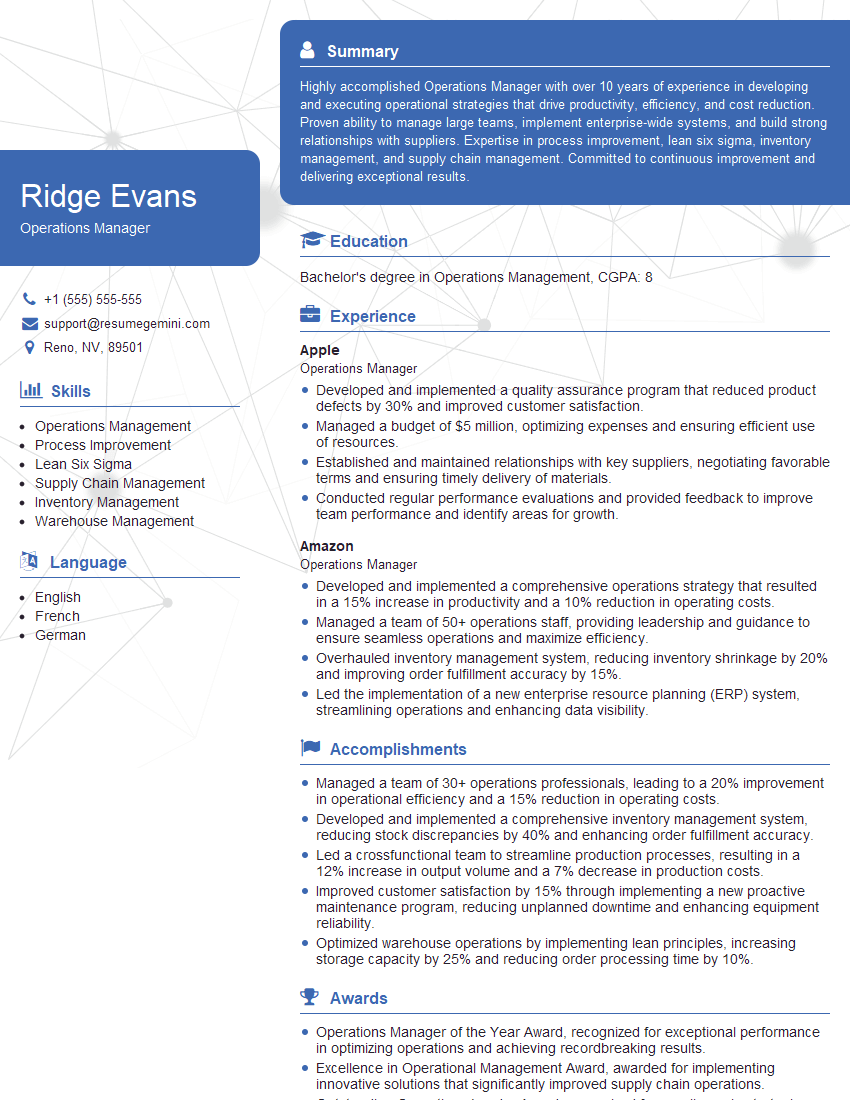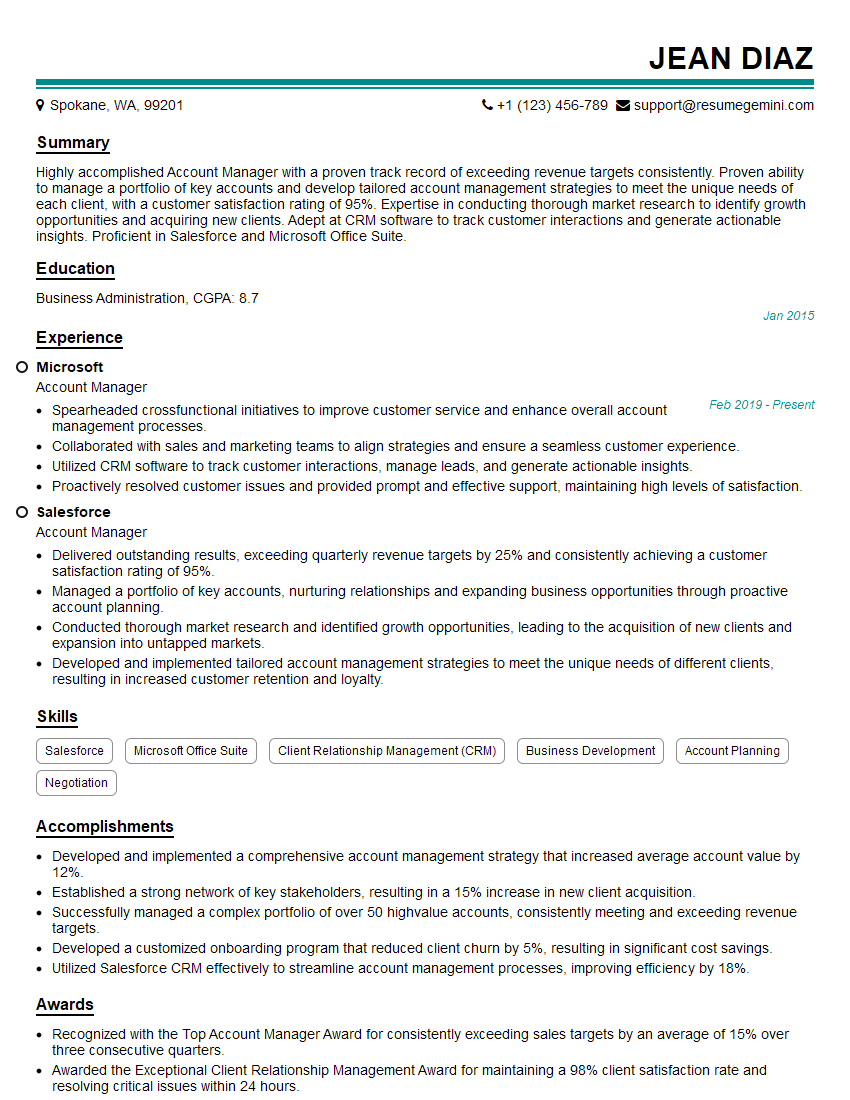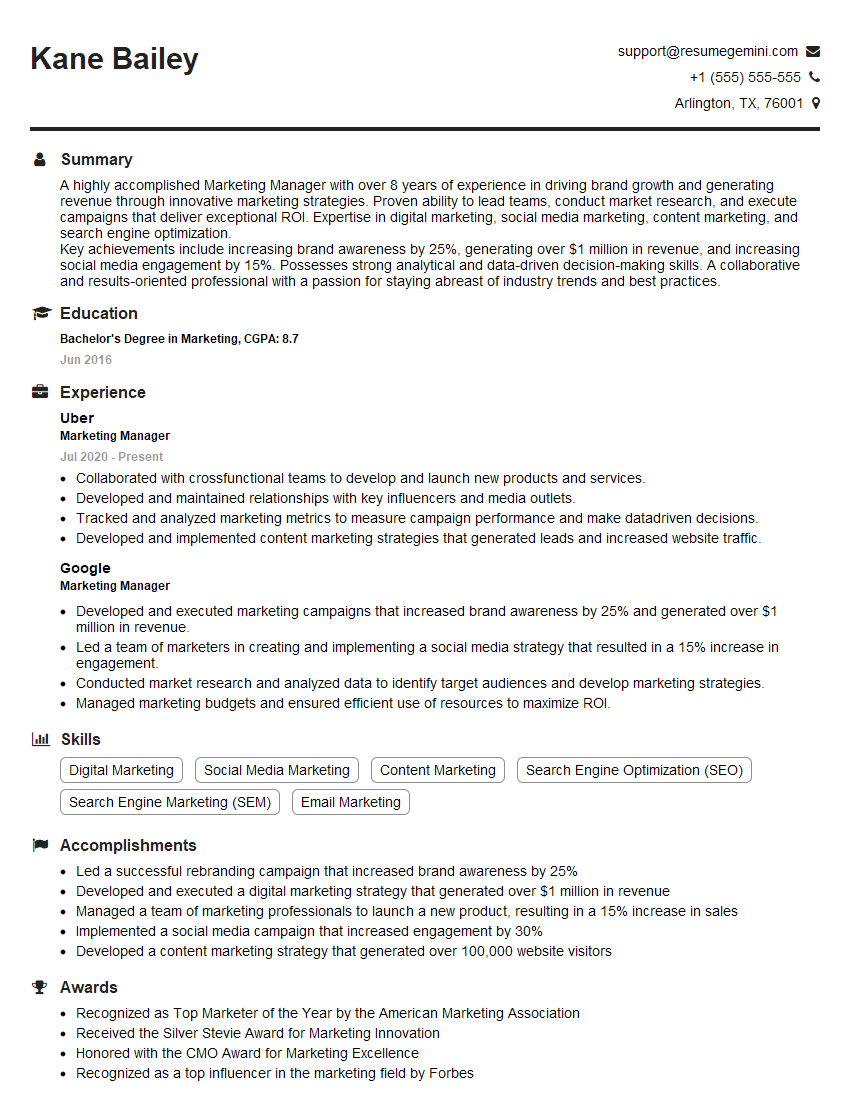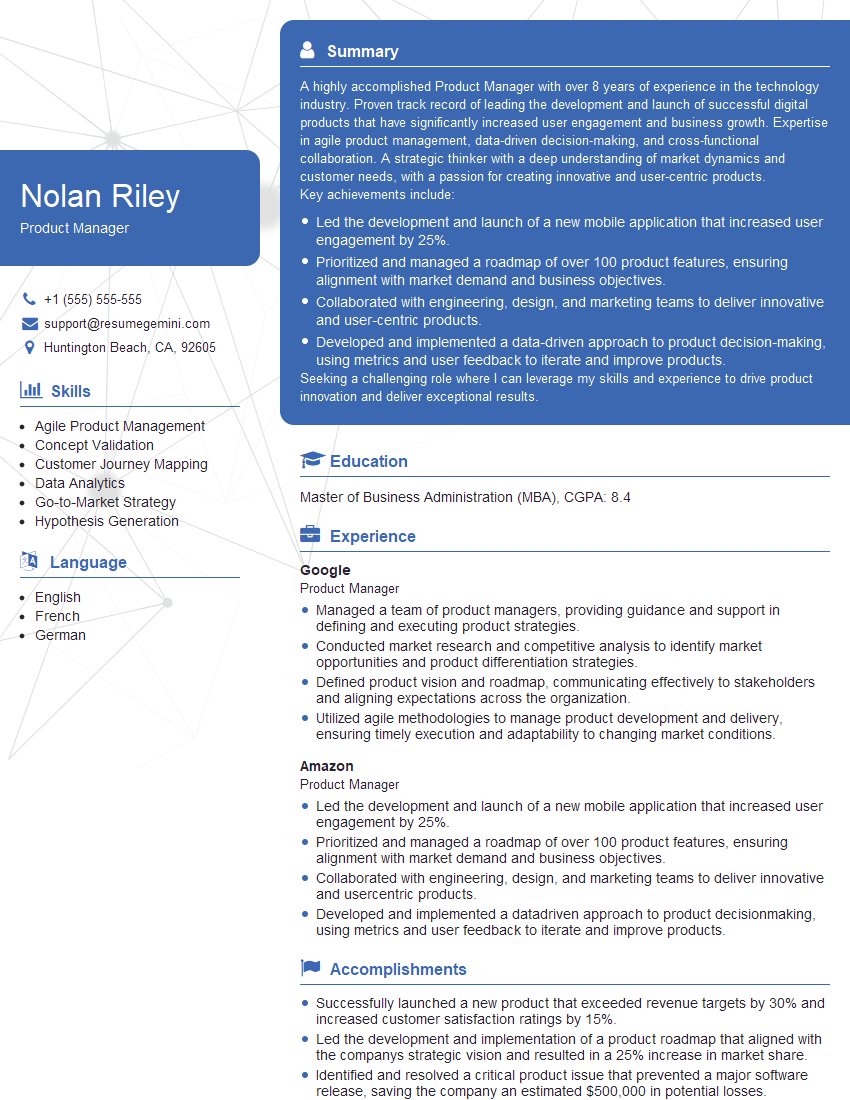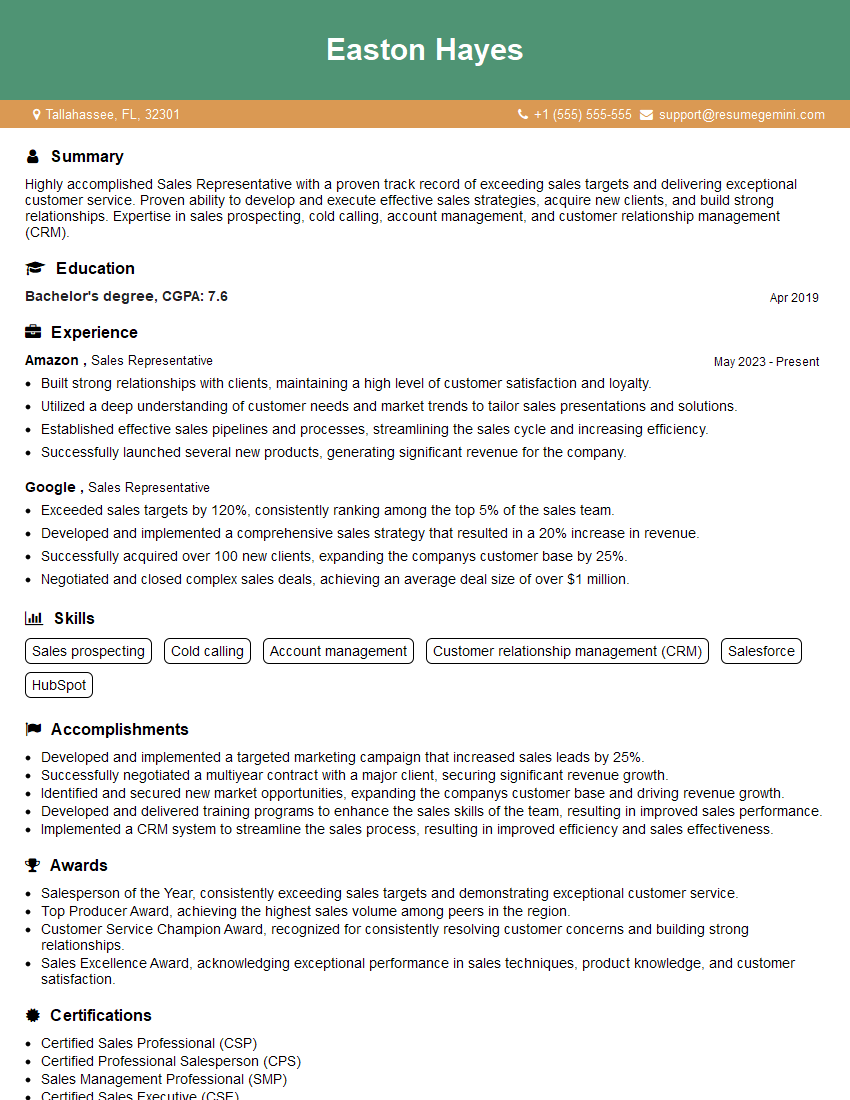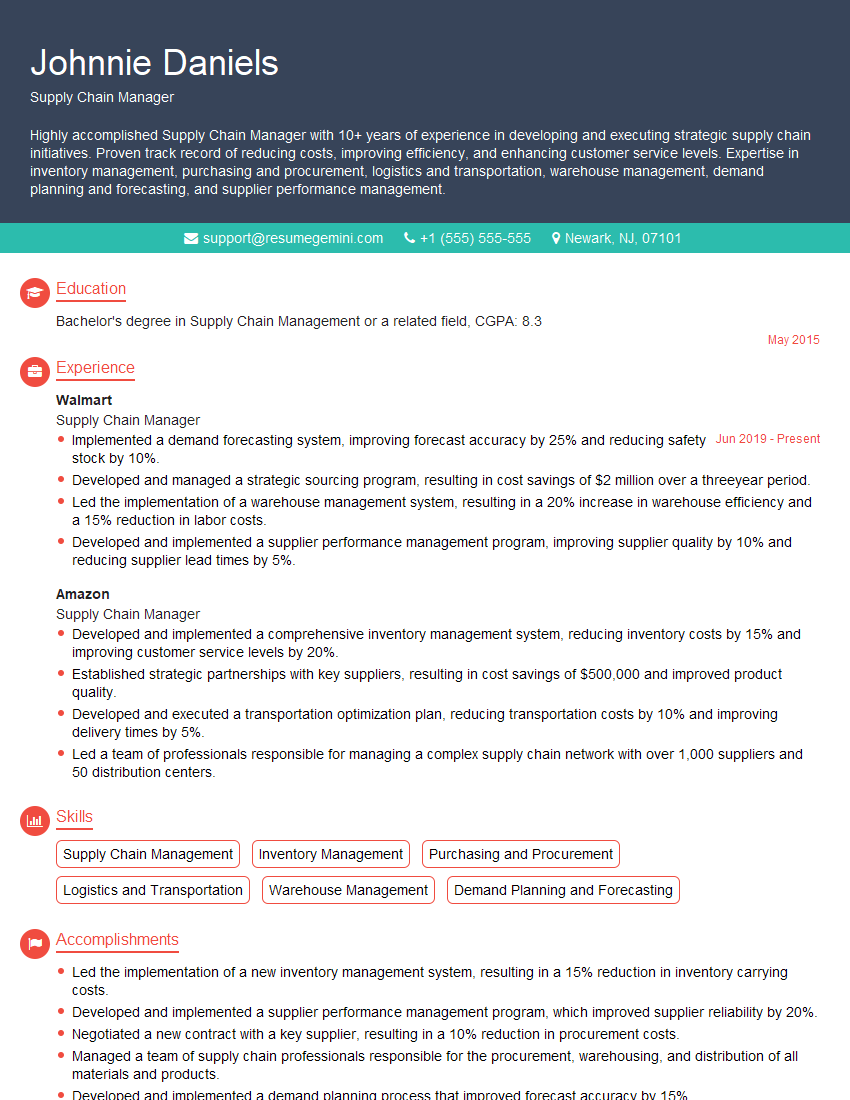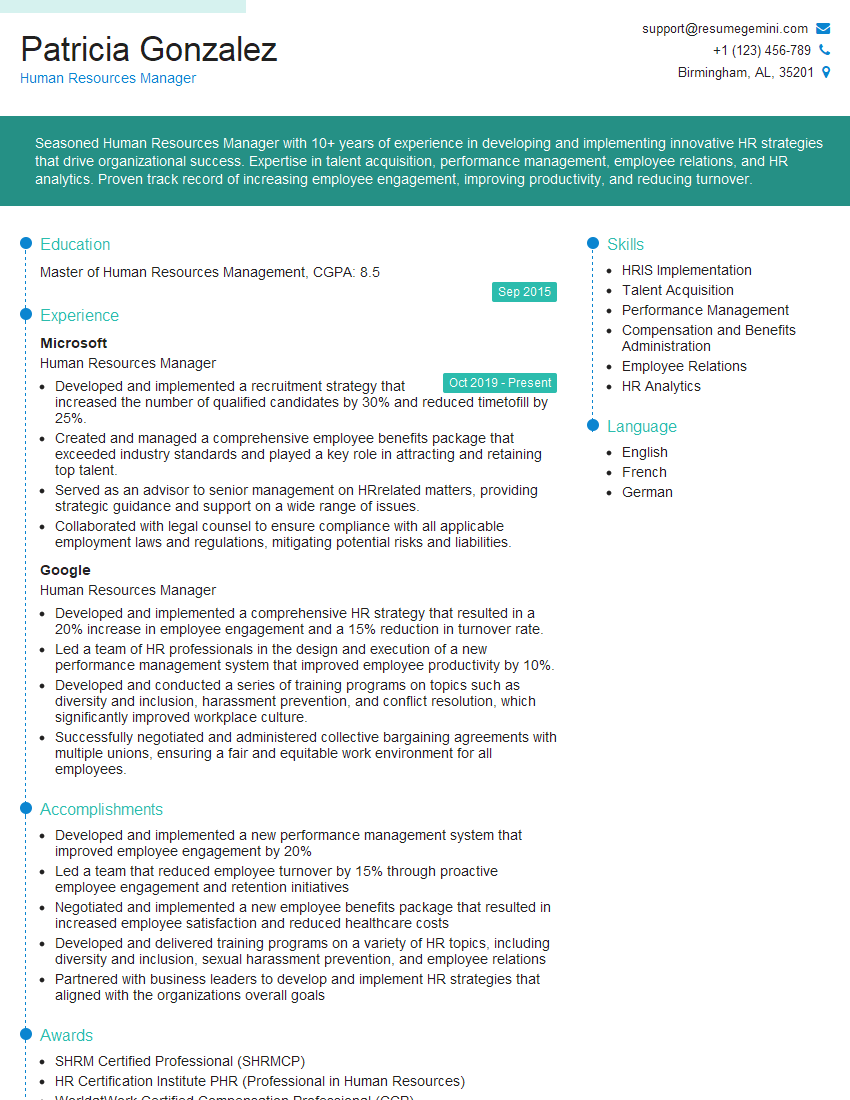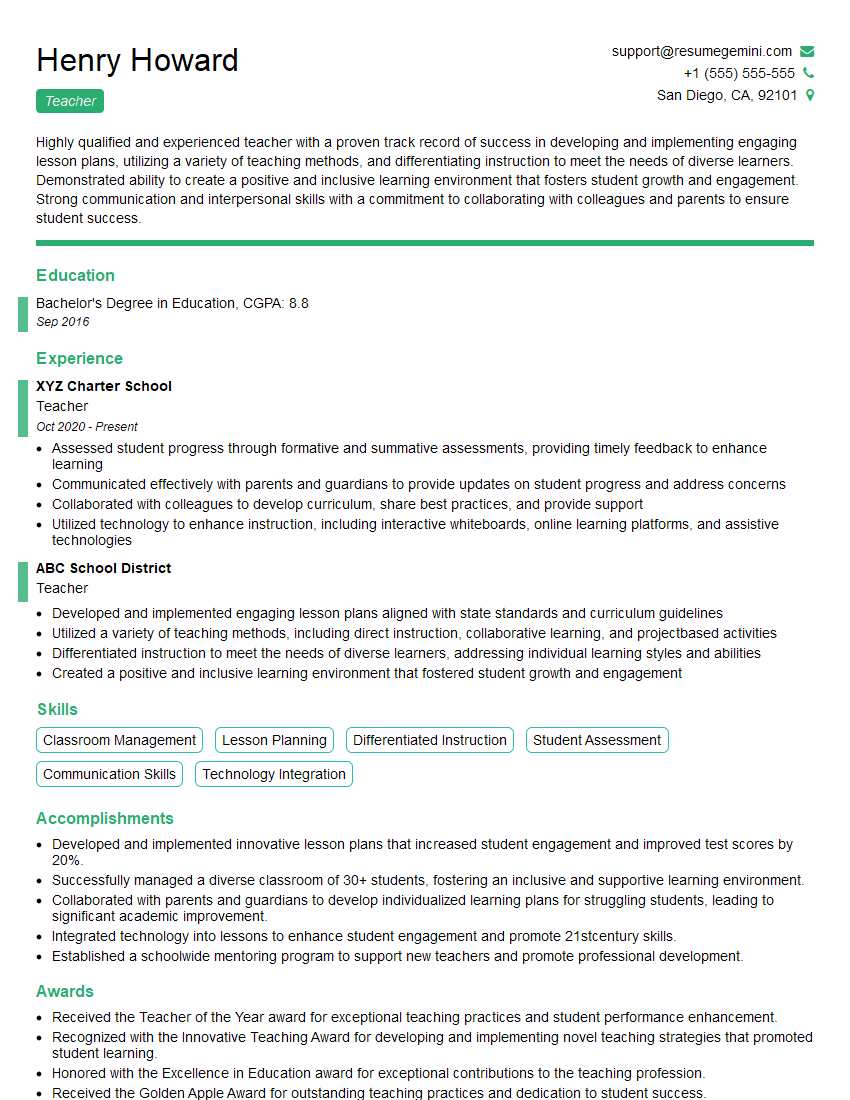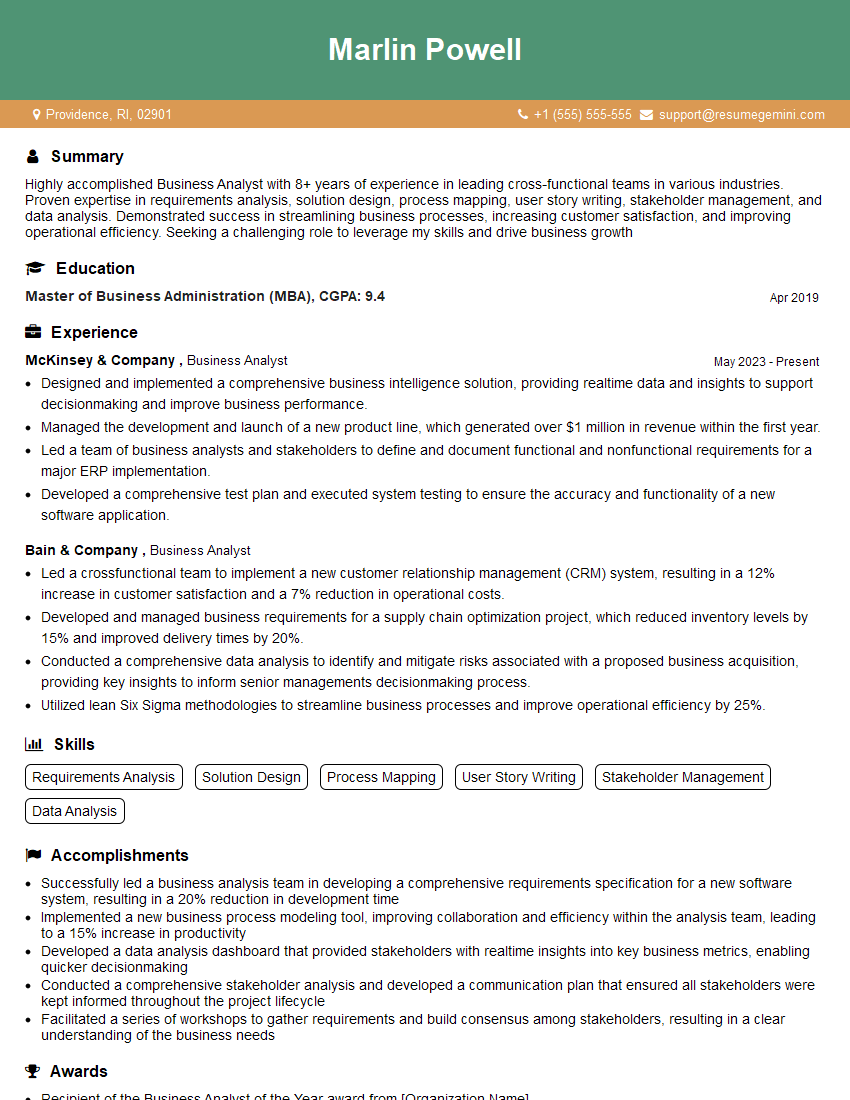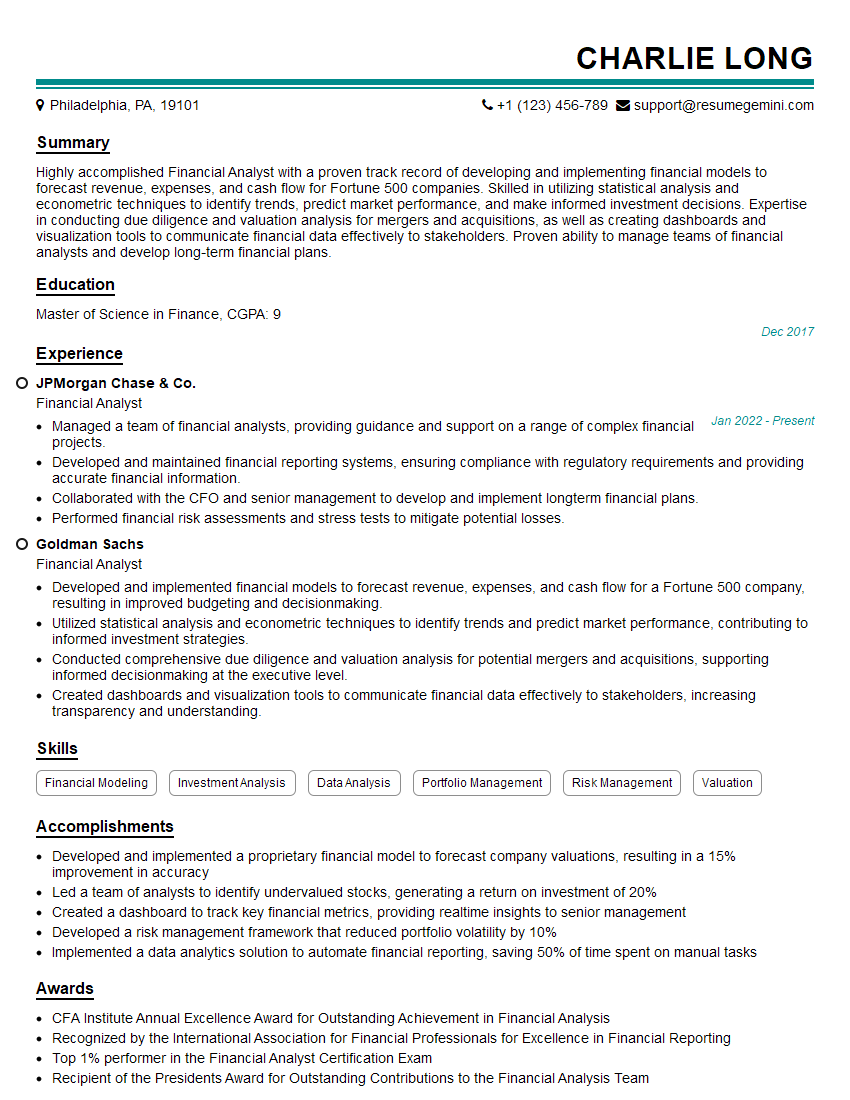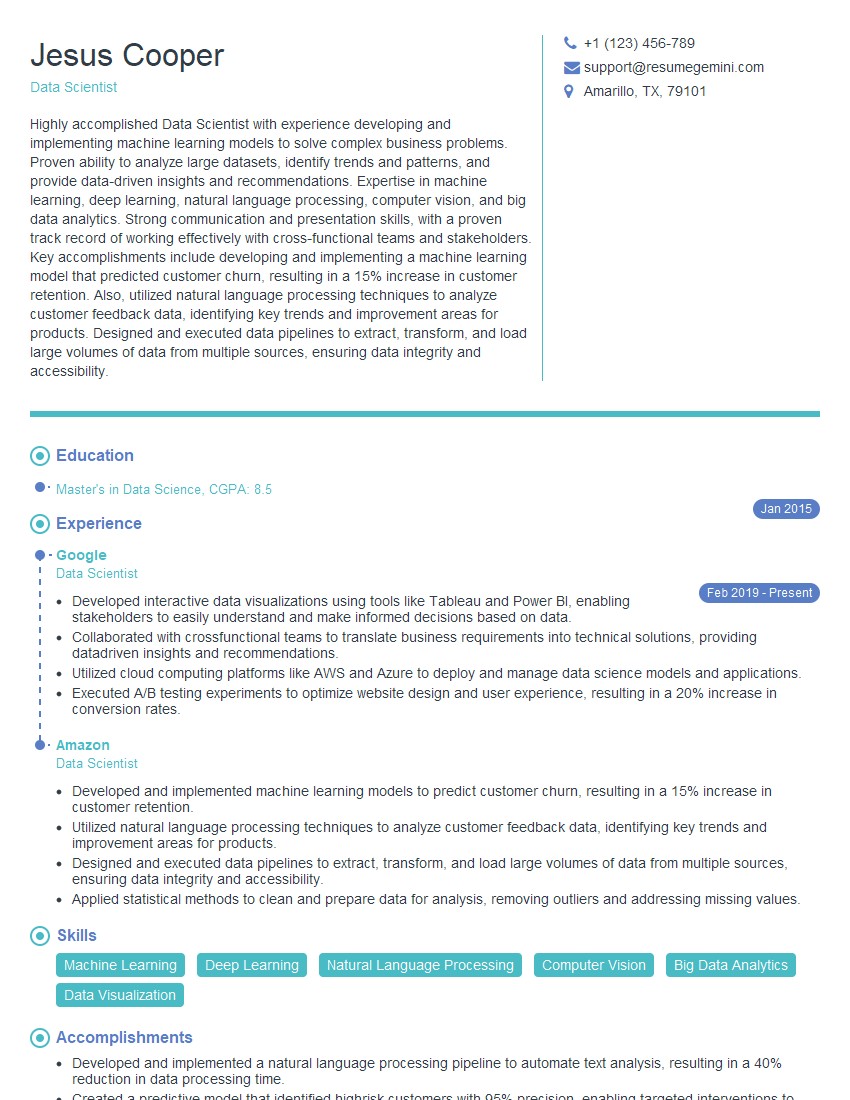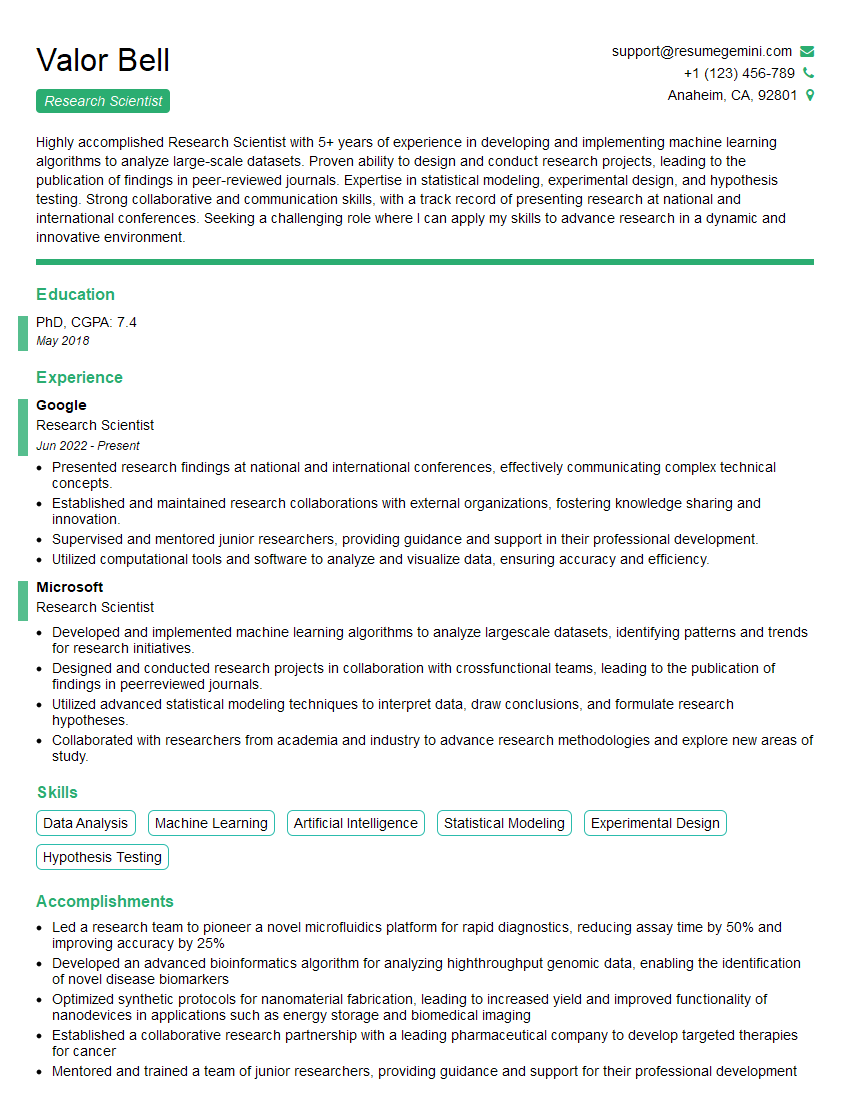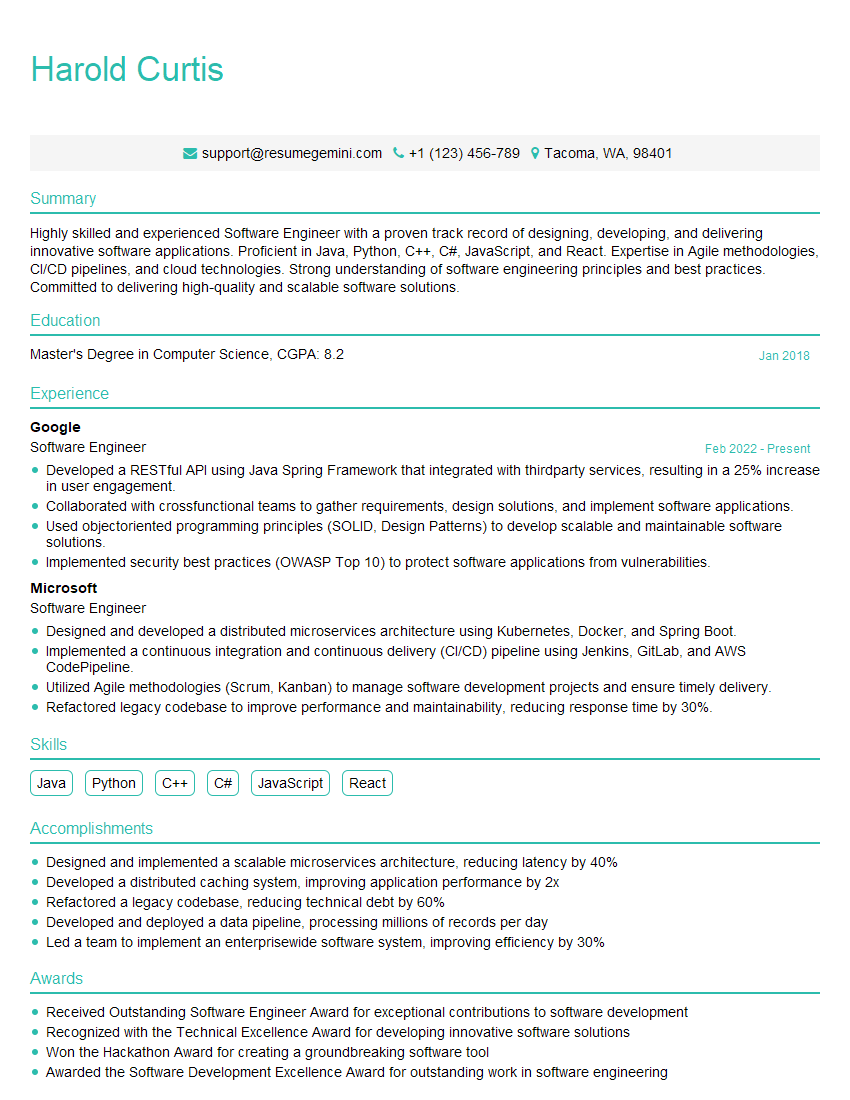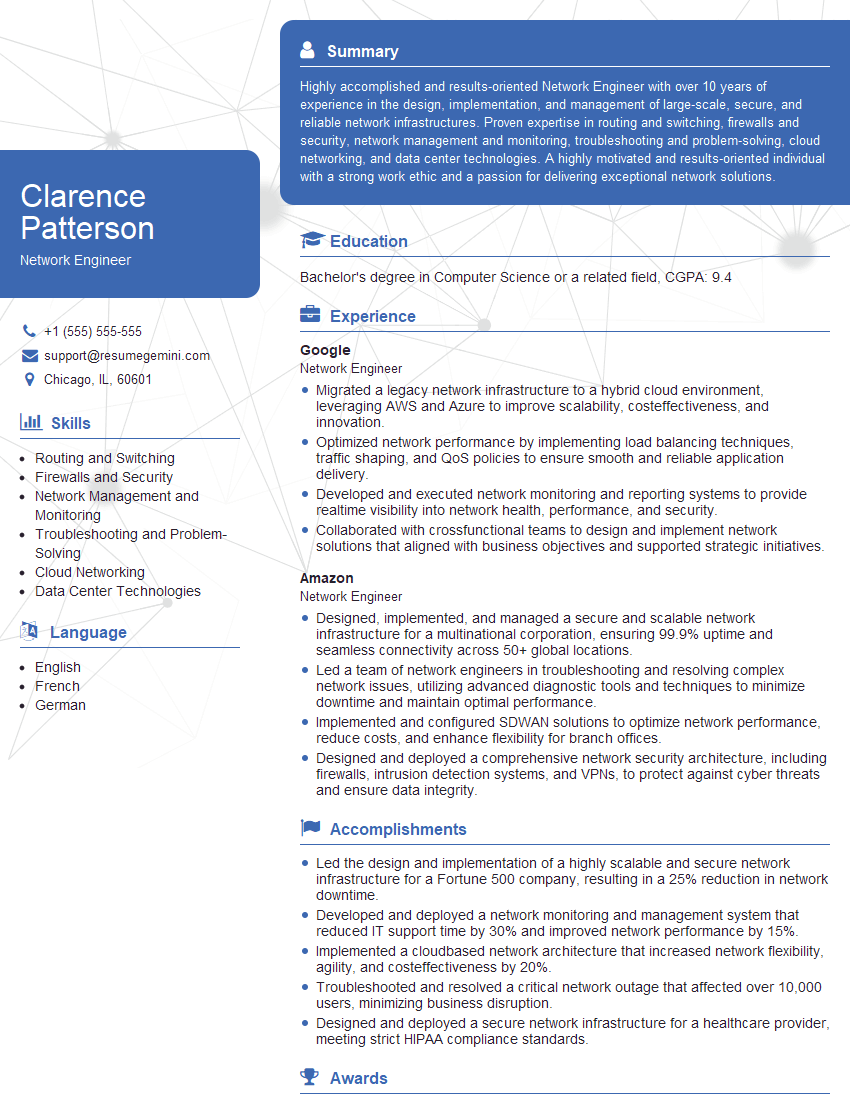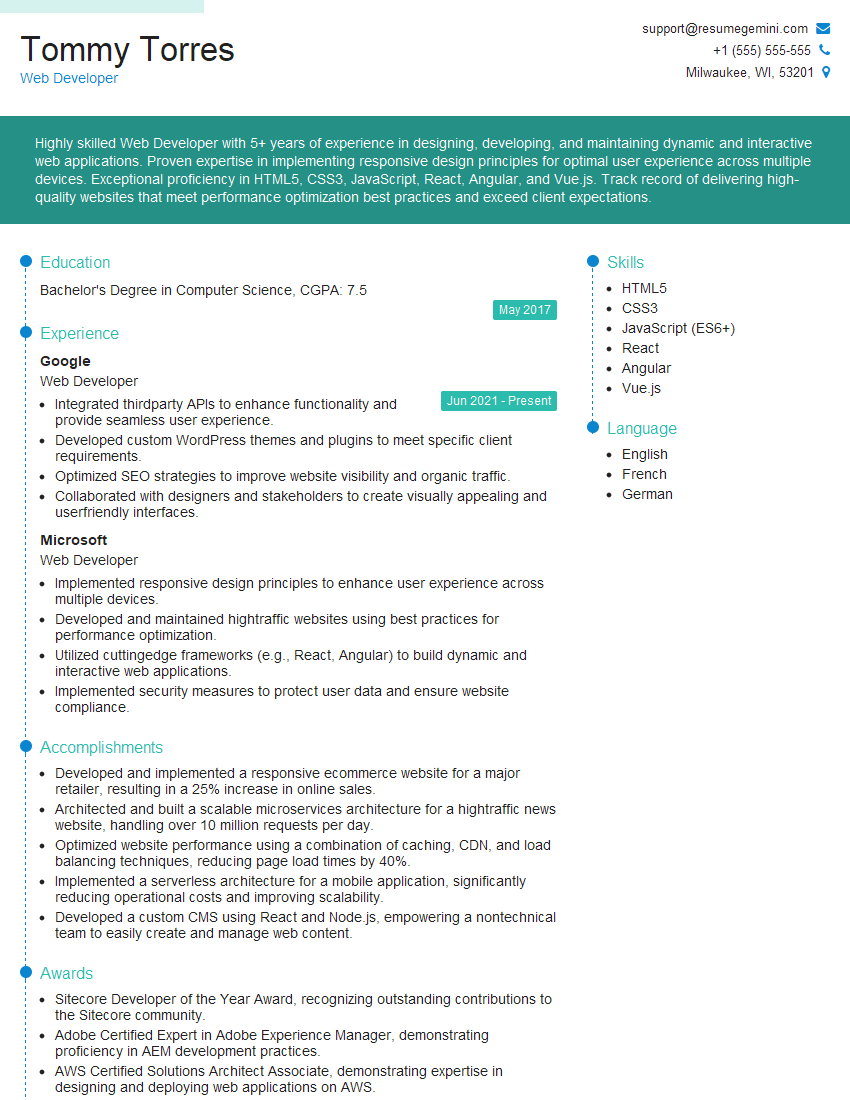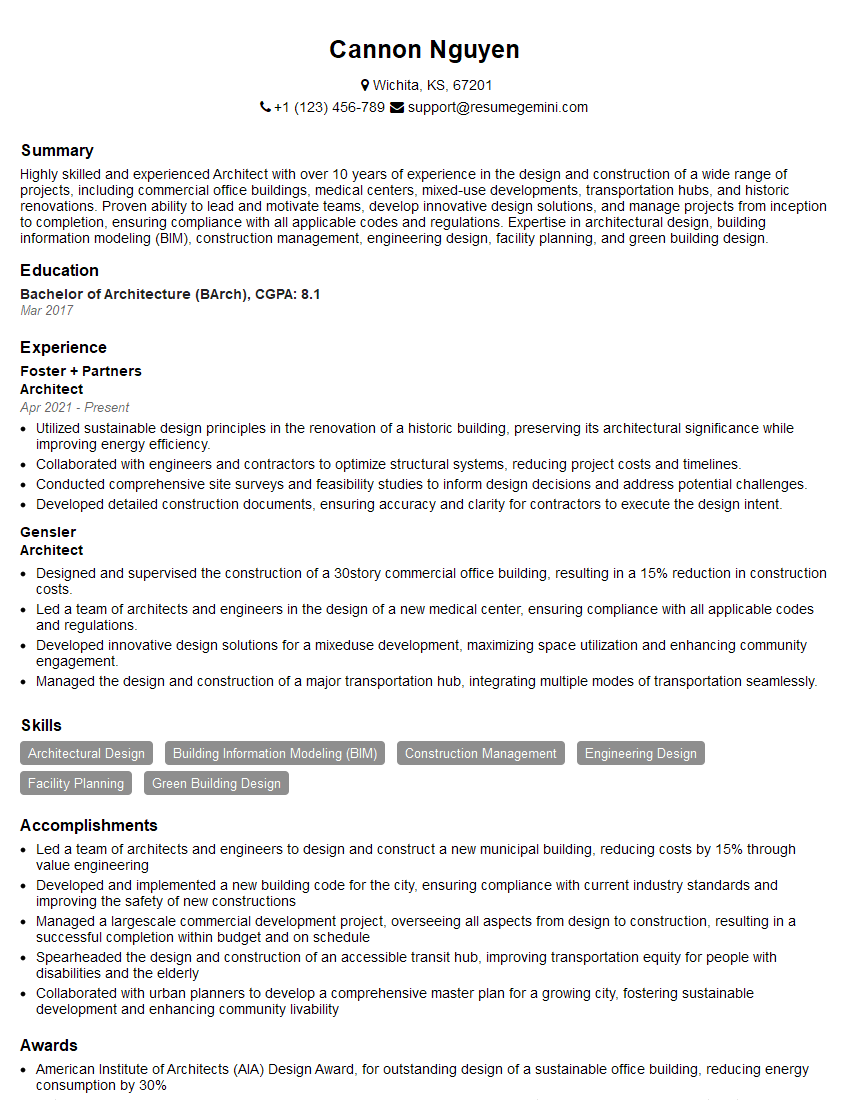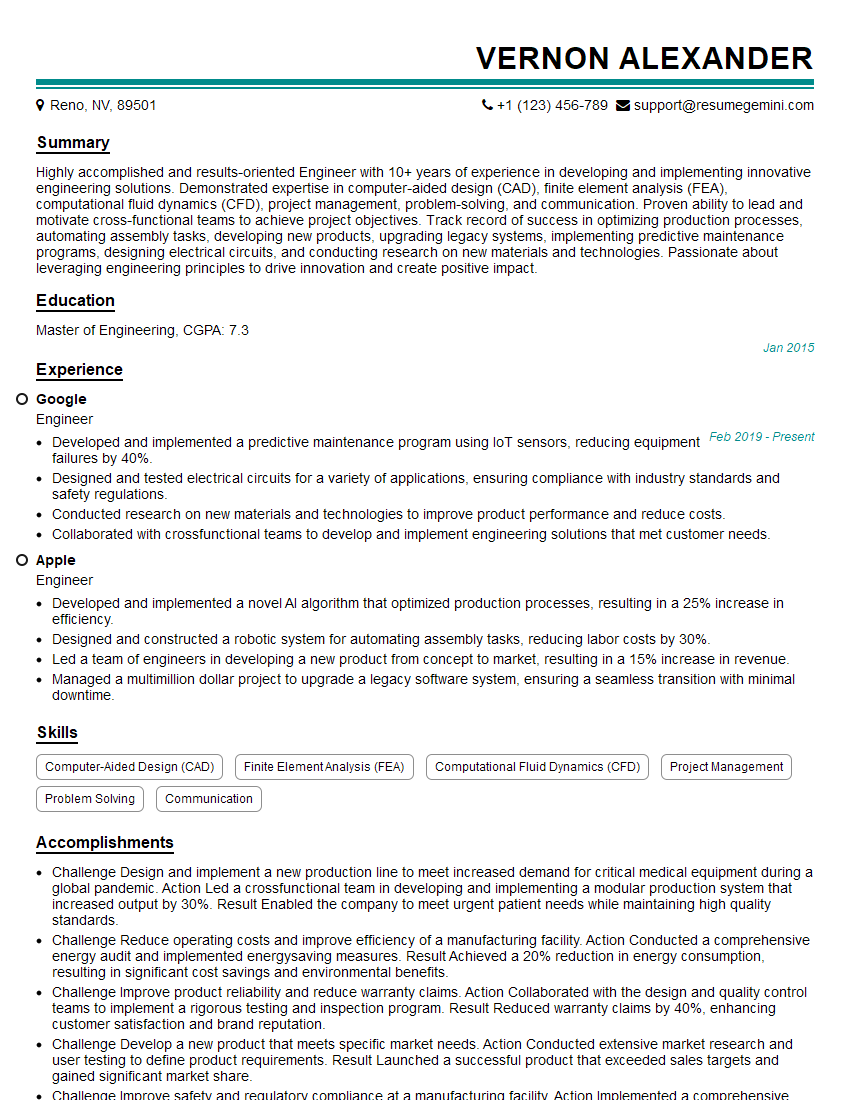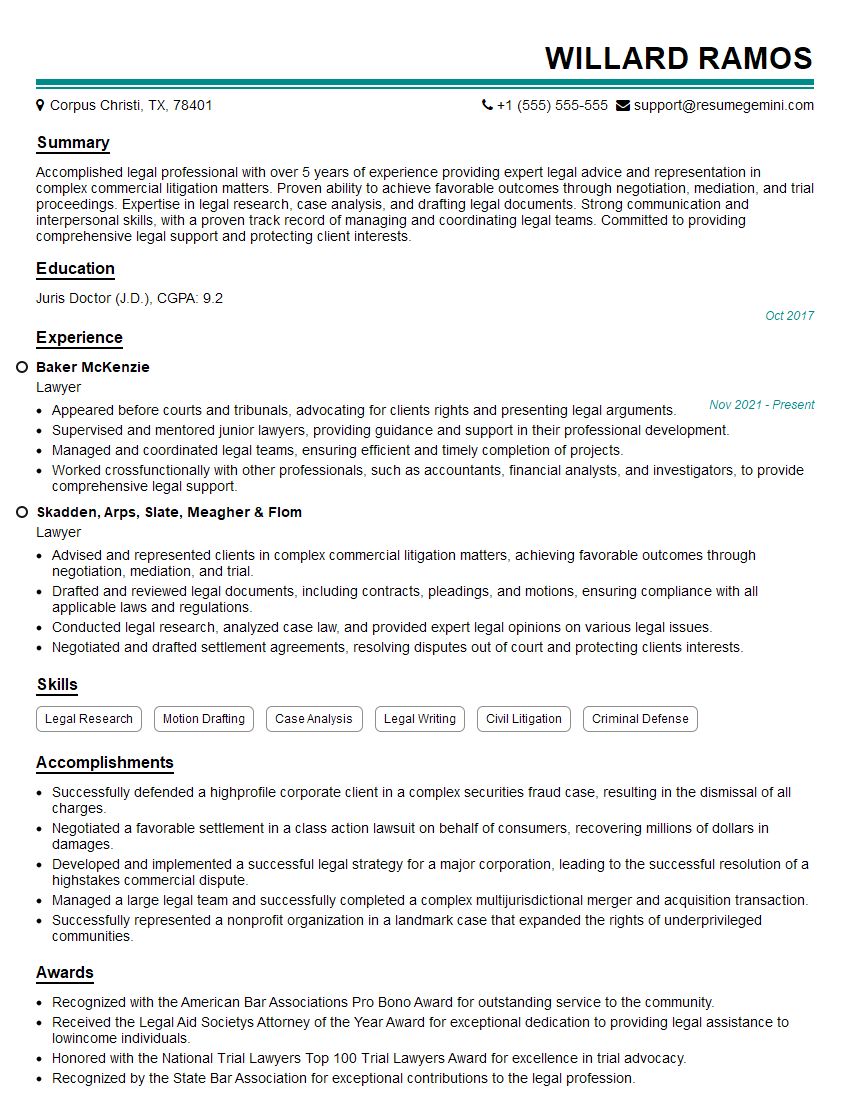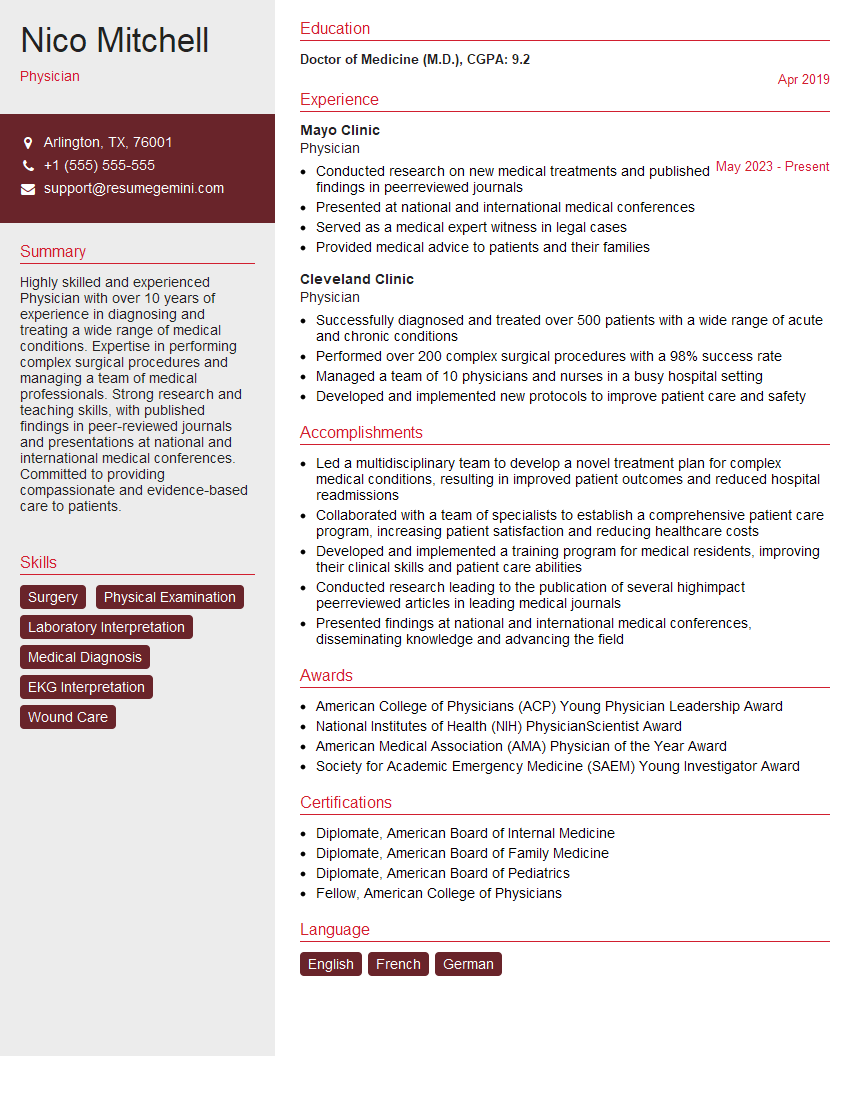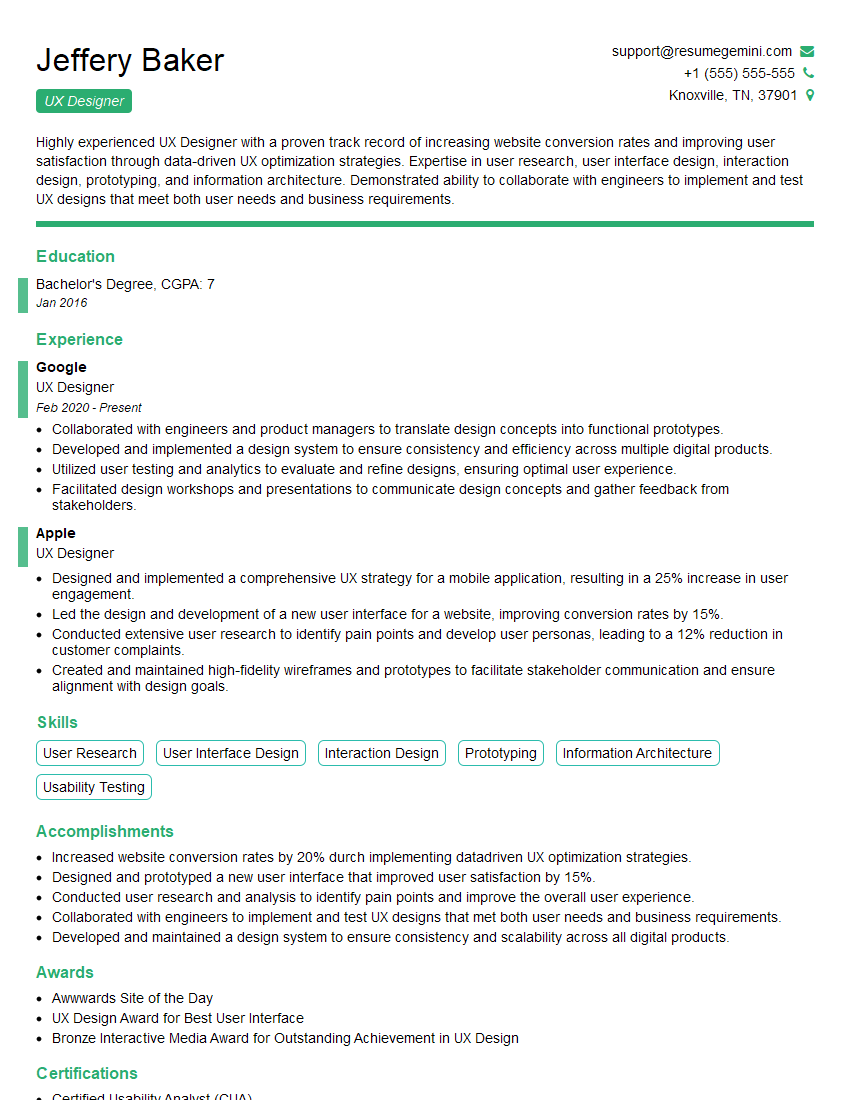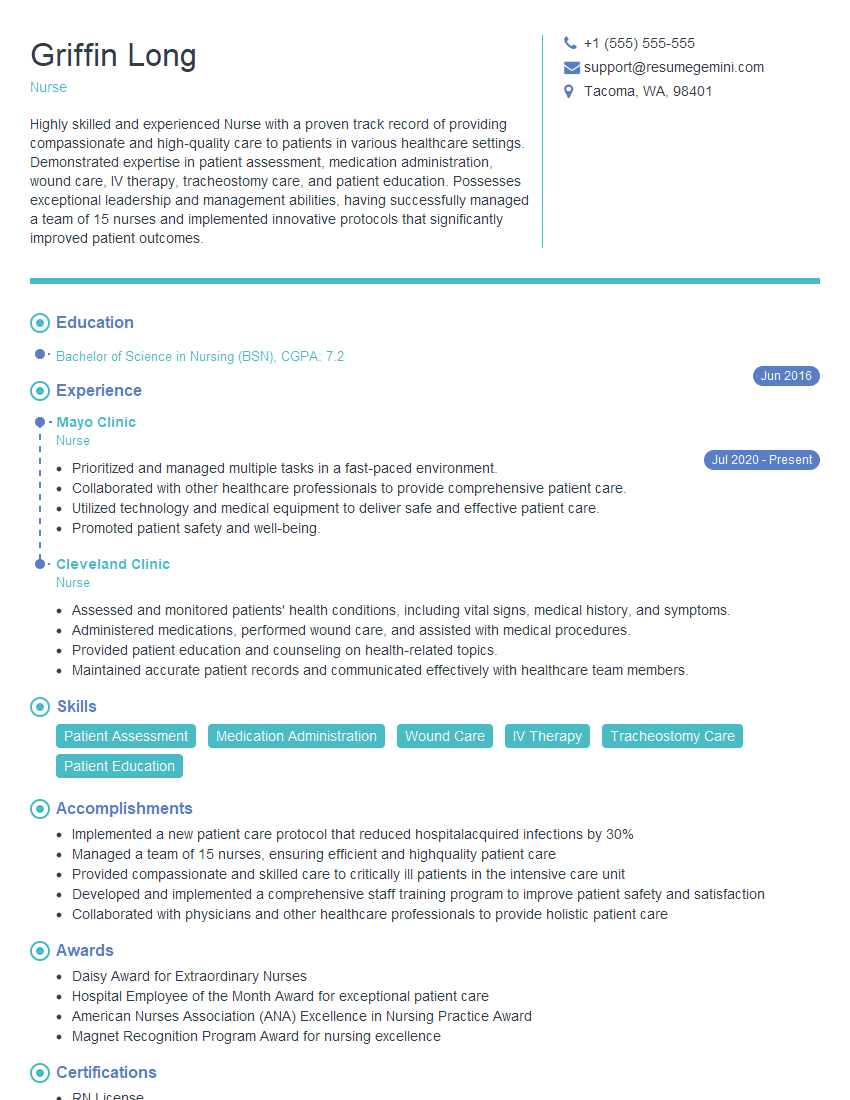The thought of an interview can be nerve-wracking, but the right preparation can make all the difference. Explore this comprehensive guide to Willingness to relocate interview questions and gain the confidence you need to showcase your abilities and secure the role.
Questions Asked in Willingness to relocate Interview
Q 1. What is your preferred relocation timeframe?
My preferred relocation timeframe is flexible, but ideally within a 2-4 week window. This allows sufficient time for me to tie up loose ends in my current location and smoothly transition into my new role and environment. Shorter timeframes can be stressful and increase the chance of overlooking important details. Longer timeframes, while offering more planning flexibility, can lead to unnecessary delays and extended periods of uncertainty.
However, I am adaptable and understand that circumstances may dictate a different timeline. I am prepared to work collaboratively with the hiring team to find a timeframe that works best for both of us.
Q 2. Are you willing to relocate internationally?
Yes, I am willing to relocate internationally. I view international relocation as a significant opportunity for professional and personal growth. My adaptability and cross-cultural sensitivity allow me to thrive in diverse settings. I understand the complexities involved in international moves, including visa requirements, cultural adjustments, and logistical challenges, and I am prepared to navigate these effectively.
For example, during my university years, I spent a semester studying abroad, which equipped me with valuable experience in adapting to a new culture and independent living in a foreign country. This experience strengthened my problem-solving skills and enhanced my resilience.
Q 3. Have you relocated for a job before? If so, describe the experience.
Yes, I relocated for a previous job opportunity from Chicago to Denver. This involved a cross-country move, and the experience was both challenging and rewarding. The initial phase focused on logistical aspects: selling my apartment, shipping my belongings, and finding temporary accommodation in Denver. The transition involved setting up utilities, finding a new doctor, and familiarizing myself with the new city and its infrastructure. While stressful at times, this experience honed my organizational skills and improved my ability to manage unforeseen complexities.
Professionally, the move resulted in career advancement and opened doors to new professional networks. Personally, I discovered a new appreciation for outdoor activities and a different pace of life. I actively sought out opportunities to engage with the local community, which facilitated a quicker integration into my new environment.
Q 4. What are your top three considerations when considering a relocation?
My top three considerations when evaluating a relocation are:
- Career Opportunities: The long-term career growth potential associated with the new role and location is paramount. This includes factors such as professional development opportunities, company culture, and potential for advancement within the organization.
- Cost of Living: A realistic assessment of the cost of living in the new location is crucial. This includes housing, transportation, groceries, and healthcare, which significantly impact my financial well-being.
- Lifestyle and Community: I consider the overall lifestyle and community aspects of the new location, including access to recreational activities, cultural events, and social opportunities. A supportive and welcoming community is essential for a smooth transition and successful integration.
Q 5. How would you handle the logistical challenges of a relocation?
I approach logistical challenges with a structured, proactive approach. My process involves creating detailed checklists for each stage of the relocation, starting with finding reliable movers and organizing the shipment of my belongings. I also research and secure temporary accommodation well in advance. I utilize technology effectively; for instance, I utilize online tools to manage moving expenses, track shipment progress, and coordinate appointments with utility companies.
Furthermore, I prioritize building a support network in the new location even before the move, reaching out to colleagues or contacts in the area for advice and recommendations. My proactive and organized approach helps mitigate potential setbacks and ensures a smoother transition.
Q 6. What is your preferred method of finding housing in a new location?
My preferred method of finding housing in a new location is a combination of online resources and direct engagement with local real estate agents. I start by thoroughly researching different neighborhoods, considering factors such as proximity to work, safety, and amenities. Online portals provide a broad overview of available properties, allowing for preliminary screening and comparison. However, I value the expertise and local market knowledge provided by real estate agents, who can offer valuable insights and assist with negotiations.
I also leverage personal networks; if I have contacts in the new location, I tap into their knowledge and experience for recommendations on neighborhoods and reliable real estate professionals.
Q 7. How do you manage stress during a major life change like relocation?
Managing stress during a major life change like relocation requires a multi-pronged approach. First, I prioritize planning and organization to minimize uncertainty and reduce anxiety. Creating detailed checklists and timelines helps me stay on track and avoid feeling overwhelmed. I also maintain open communication with my family and friends, seeking support and sharing my experiences. This helps me process emotions and maintain a sense of connection during the transition.
Moreover, I incorporate stress-reducing activities into my routine, such as regular exercise, mindfulness practices, or hobbies, to maintain physical and mental well-being. I proactively seek out social connections in the new community to foster a sense of belonging and reduce feelings of isolation. By employing these strategies, I ensure a healthy and productive transition during relocation.
Q 8. What resources do you plan to utilize to support your relocation?
Relocation involves careful planning and utilizing various resources. My approach is multifaceted and starts with thorough research.
- Online Relocation Resources: I’d leverage websites dedicated to relocation, such as those providing city guides, cost-of-living comparisons, and neighborhood reviews. This helps in understanding the new city’s infrastructure, cultural aspects, and potential challenges.
- Professional Relocation Services: Depending on the company’s offer, I may explore using professional relocation services. These services often assist with finding housing, managing logistics, and even providing temporary accommodation.
- Networking: Connecting with people already residing in the new city—either through professional networks or personal contacts—is invaluable. They can offer firsthand insights into the best neighborhoods, commuting options, and hidden gems.
- Government and Community Resources: I’d investigate local government websites and community organizations for information on housing assistance programs, job fairs, and other relevant resources.
For example, during a previous relocation, I used a combination of online city guides and recommendations from colleagues already living in the target city to find a suitable apartment within my budget and commute time.
Q 9. What are your financial expectations related to relocation?
Financial expectations regarding relocation are crucial and must be clearly defined. My approach includes a detailed breakdown of anticipated costs and a negotiation strategy.
- Relocation Package Negotiation: I would discuss the specifics of the relocation package—including moving expenses, temporary housing allowances, and any settling-in stipends—with the hiring company during the offer stage. I’d ensure the package adequately covers potential costs and reflects the realities of the move.
- Cost Budgeting: I’d create a detailed budget encompassing moving expenses (packing, transportation, storage), temporary housing costs (rent, utilities), initial living expenses (groceries, transportation), and any unforeseen costs. This helps ensure I can manage my finances effectively during the transition.
- Financial Reserves: I’d maintain a financial cushion to cover unexpected expenses or potential gaps in the relocation package. This is crucial to mitigate financial stress during a potentially chaotic period.
For instance, during a past relocation, I successfully negotiated a higher relocation allowance based on a detailed presentation of projected moving and settling-in costs, demonstrating the value of my preparedness.
Q 10. How would you approach networking in a new city?
Networking in a new city requires a proactive and strategic approach. It’s not merely about attending events but building genuine connections.
- Professional Networking Platforms: I would actively participate in professional organizations, online forums, and industry events relevant to my field. This allows me to connect with potential colleagues, mentors, and clients in the new area.
- Industry Events and Conferences: Attending local industry conferences and workshops provides opportunities to meet professionals and learn about the local business landscape.
- Community Involvement: Engaging in community activities, volunteering, or joining social clubs related to my hobbies broadens my network beyond the professional sphere. This helps integrate into the new city’s culture.
- Informational Interviews: I’d reach out to people in my field via LinkedIn or other professional platforms to request informational interviews. These conversations allow for insightful advice and introductions to others in the network.
I believe building relationships takes time. During my previous relocation, joining a local hiking group allowed me to connect with people outside my professional field, expanding my social circle and gaining valuable insights into the community.
Q 11. Describe a time you adapted quickly to a new environment.
Adapting to new environments is a crucial skill for anyone navigating relocation. I once faced a sudden job transfer to a different country with a vastly different culture and language.
My approach involved a combination of proactive learning and an open mindset. I immediately enrolled in an intensive language course, focusing on practical communication skills. I also immersed myself in the local culture, exploring local markets, trying new foods, and making an effort to learn local customs. I made a conscious effort to build rapport with colleagues and locals, demonstrating a willingness to learn and embrace the differences.
Within three months, I had become fluent enough in the local language to participate comfortably in work meetings, and had built a solid network of friends and colleagues. This experience highlighted the importance of proactive learning, cultural sensitivity, and a genuine desire to connect with the new community.
Q 12. How do you prioritize your personal and professional life when relocating?
Prioritizing personal and professional life during relocation requires careful planning and self-awareness. It’s a delicate balance that needs constant attention.
- Time Management: Effective time management is critical. I would establish a realistic schedule that allocates time for both professional integration (networking, job tasks) and personal activities (exploring the new city, socializing, and maintaining existing relationships).
- Support System: Maintaining contact with friends and family back home is essential to prevent feelings of isolation. Regular communication helps retain a sense of stability and support during the transition.
- Self-Care: Prioritizing self-care activities, such as exercise, healthy eating, and mindfulness, is crucial to manage stress and maintain well-being during the relocation process.
- Setting Boundaries: Learning to set boundaries between professional demands and personal time is crucial to prevent burnout and maintain a healthy work-life balance.
For example, I scheduled regular video calls with loved ones and ensured I dedicated time each week for exploring the new city and engaging in hobbies, preventing feelings of being overwhelmed.
Q 13. How would you handle a job offer requiring relocation that is less than ideal?
Handling a less-than-ideal job offer that necessitates relocation requires a careful evaluation of priorities and potential compromises.
- Assess the Offer: Conduct a thorough assessment of the offer, including compensation, career growth opportunities, and the overall work environment. Weigh the pros and cons against your long-term career goals.
- Negotiate: Explore opportunities to negotiate aspects of the offer, such as salary, benefits, or relocation support. This could potentially improve the overall attractiveness of the opportunity.
- Seek External Advice: Consult with mentors, colleagues, or career counselors to gain external perspectives and insights before making a decision.
- Consider Alternatives: Explore other job opportunities in the desired location to compare options. This provides a benchmark to assess the offered position’s value.
In a past situation, I carefully considered a less-than-ideal relocation offer. After a thorough evaluation and negotiation, I opted to accept the offer based on the long-term career growth potential it offered. While it was not perfect, it was a stepping stone towards my broader career objectives.
Q 14. Are you comfortable with a temporary living situation during the relocation process?
I am comfortable with a temporary living situation during the relocation process. It’s a practical and cost-effective approach, especially in unfamiliar cities.
Understanding the short-term nature of such arrangements allows me to focus on finding permanent housing without the added pressure of immediate long-term commitment. I would research different temporary options like short-term rentals, serviced apartments, or temporary housing provided by the company. This allows flexibility while I explore the new location and find a more suitable long-term accommodation.
During my previous relocation, I utilized a short-term rental for the first month. This allowed me to familiarize myself with different neighborhoods before committing to a longer lease. This approach proved beneficial in saving time and finding an ideal living space.
Q 15. How would you handle unexpected challenges during your relocation?
Unexpected challenges are inevitable during relocation. My approach involves proactive planning and a flexible mindset. I begin by creating a detailed checklist of potential issues, ranging from logistical hurdles like finding housing and transportation to more personal challenges such as adjusting to a new social environment. For example, if my pre-arranged housing falls through, I have a backup plan involving temporary accommodations and a dedicated timeframe for securing permanent housing. If I encounter unexpected delays with utilities, I have emergency contact information and backup solutions already in place. I also recognize that adapting to a new culture takes time, and I build buffer time into my relocation schedule for this process. Finally, I embrace a problem-solving attitude, understanding that setbacks are opportunities for learning and adaptation. I actively seek support from my new employer, my family and friends, or even online communities when necessary.
Career Expert Tips:
- Ace those interviews! Prepare effectively by reviewing the Top 50 Most Common Interview Questions on ResumeGemini.
- Navigate your job search with confidence! Explore a wide range of Career Tips on ResumeGemini. Learn about common challenges and recommendations to overcome them.
- Craft the perfect resume! Master the Art of Resume Writing with ResumeGemini’s guide. Showcase your unique qualifications and achievements effectively.
- Don’t miss out on holiday savings! Build your dream resume with ResumeGemini’s ATS optimized templates.
Q 16. What steps do you take to research a new city before relocating?
Thorough research is crucial before any relocation. My process involves a multi-faceted approach. First, I use online resources such as city websites, local news outlets, and relocation guides to get an overview of the area, including its cost of living, climate, and overall safety. Second, I leverage social media and online forums to gain insights from residents’ perspectives on different neighborhoods and local amenities. This includes looking for reviews on schools, restaurants, and local businesses. Third, I try to connect with people already living in the city, either through professional networks or personal contacts, to get firsthand information and advice. For instance, if I’m considering a city with a strong tech industry, I’ll try to connect with people in that sector to get their opinion on the work-life balance and job market. Finally, if possible, I plan a visit to the city to experience it firsthand. This allows me to explore neighborhoods, get a feel for the local culture, and verify information gathered through online research.
Q 17. Describe your ideal work-life balance in a new location.
My ideal work-life balance involves a healthy integration of professional and personal pursuits. This means having sufficient time for both my career responsibilities and my personal life, including family, hobbies, and personal well-being. In a new location, I would seek out opportunities for both professional growth and social engagement. For instance, I would be interested in companies with flexible working arrangements that allow me to maintain a healthy work schedule. Additionally, I’d look for opportunities to join community groups or clubs that align with my interests, allowing for a fulfilling social life outside of work. A good work-life balance, for me, isn’t just about the number of hours worked, but also the quality of those hours, and the time I have to pursue my passions and personal goals.
Q 18. How do you plan to maintain connections with family and friends after relocating?
Maintaining close connections with family and friends after relocation requires proactive effort. I use a blend of modern and traditional methods. Regular video calls, phone conversations, and instant messaging help to maintain daily contact. I also make a conscious effort to plan visits back home and invite family and friends to visit me in my new location. Social media platforms offer another way to stay connected, and sharing photos and updates allows for continued participation in shared experiences. For example, I’ll create a shared online photo album to document my experiences in the new city. I also understand the importance of regular communication, and therefore will make scheduled calls and messages a priority, even if it is only for a few minutes per week.
Q 19. What is your level of comfort with different cultures and lifestyles?
I am very comfortable with different cultures and lifestyles. I believe that embracing diversity enriches one’s life and broadens one’s perspectives. I have a keen interest in learning about other cultures, and I see this as a significant opportunity for personal growth. In the past, I have lived in [mention a previous location or experience with a different culture if applicable], and this experience taught me the importance of empathy, open-mindedness, and respect for different traditions. I actively seek out opportunities to engage with different cultural groups and learn from their perspectives. I’m not afraid to step outside of my comfort zone and embrace new experiences. This adaptable approach allows me to integrate into new communities smoothly and build meaningful relationships with people from diverse backgrounds.
Q 20. How do you assess the risks and benefits of relocating for a job?
Assessing the risks and benefits of relocating for a job requires a careful and systematic approach. I start by clearly defining my goals and priorities. This could include career advancement, salary increase, improved work-life balance, or a change of scenery. Next, I meticulously weigh the potential benefits against the associated risks. The benefits could include career progression, higher salary, better opportunities for professional development, or improved lifestyle. On the other hand, the risks might include financial uncertainty, disruption to social networks, difficulties in finding suitable housing, or cultural adjustment challenges. I use a cost-benefit analysis framework, quantifying as much as possible, to gain clarity on the potential return on investment. I would also consider factors such as the job market in the new location and the long-term career prospects offered. The final decision would be based on a careful evaluation of this comprehensive assessment.
Q 21. What are your expectations regarding company relocation assistance?
My expectations regarding company relocation assistance are realistic and informed. I anticipate that a reputable employer would offer a comprehensive package that addresses the significant costs and logistical challenges associated with relocation. This would ideally include assistance with relocation expenses such as moving costs, temporary housing, travel expenses for myself and my family, and support in finding permanent housing. I would also appreciate assistance with the administrative tasks involved, such as arranging for utility connections and facilitating school enrollment for my children (if applicable). Transparency and clear communication throughout the process are essential. A well-structured relocation package reduces stress and facilitates a smooth transition to the new location, allowing me to focus on settling in and starting my new role effectively. While I understand that the level of assistance might vary depending on the company policy and the individual circumstances, I would expect a reasonable level of support in line with industry standards.
Q 22. How will you maintain your current level of professional productivity during relocation?
Maintaining peak productivity during a relocation requires careful planning and proactive measures. It’s not just about moving boxes; it’s about a seamless transition of my workflow.
- Pre-Move Planning: Before the move, I’d finalize any urgent projects, delegate tasks where possible, and create detailed handover documents. This minimizes disruption during the transition period.
- Technology & Connectivity: I’d ensure I have reliable internet access set up in my new location well in advance. This includes testing my remote access to company systems and crucial software. A backup plan for internet outages is also crucial.
- Time Management: I’d allocate specific time blocks for unpacking, settling in, and work. I find time-blocking incredibly effective for maintaining focus amidst the chaos of a move. For example, I might dedicate mornings to work and afternoons to unpacking.
- Communication: Proactive communication with my team and manager is key. Keeping them updated on my availability and any potential delays helps manage expectations and maintain team cohesion.
For example, during my last move, I completed all high-priority tasks a week before moving day, ensuring a smooth handover to my colleagues. This allowed me to focus on settling in without jeopardizing deadlines.
Q 23. What is your preferred communication method regarding relocation updates?
My preferred communication method for relocation updates is a blend of approaches, prioritizing clarity and efficiency. I find that a combination of email for formal updates, instant messaging (like Slack or Teams) for quick questions and updates, and regular phone calls for more in-depth discussions works best.
Email provides a documented record of key information and decisions. Instant messaging allows for quick clarification and collaborative problem-solving, while phone calls facilitate richer conversations and allow for better tone interpretation, crucial during a potentially stressful period.
For example, I would use email to formally communicate my moving dates and new contact information, instant messaging to ask quick questions about local services, and a phone call to discuss logistical aspects with my manager or relocation coordinator.
Q 24. How would you manage the emotional aspects of leaving your current location?
Relocation can be emotionally taxing, involving saying goodbye to familiar surroundings and support networks. Managing these emotions effectively is crucial for a smooth transition. My approach is multifaceted.
- Acceptance & Planning: Acknowledging the emotional toll beforehand helps prepare me. I’d actively plan for maintaining connections with loved ones back home through regular calls, video chats, and visits when possible.
- Building New Connections: I actively seek to build new relationships in my new location. Joining local clubs, attending community events, or connecting with colleagues outside of work helps foster a sense of belonging.
- Self-Care: Prioritizing self-care – through exercise, mindfulness practices, or hobbies – helps manage stress and maintain emotional well-being. Regular exercise has been especially effective for me in reducing stress during big life changes.
- Seeking Support: If needed, I’m not afraid to seek professional support from a therapist or counselor experienced in managing relocation-related stress. Mental well-being is paramount.
For example, when I relocated to a new state, I made a conscious effort to join a local hiking group, which helped me meet new people and explore my new surroundings, mitigating feelings of isolation.
Q 25. What is your understanding of the local tax implications of relocation?
Understanding local tax implications is crucial for financial planning during relocation. This involves researching the tax rates, deductions, and credits available in the new location and comparing them to my current situation. I would typically consult with a tax professional or utilize online resources to get a comprehensive understanding.
Key areas to consider include state and local income taxes, property taxes (if applicable), sales taxes, and any specific tax benefits or deductions offered to new residents. Understanding these factors is important for budgeting, ensuring accurate tax filings, and making informed financial decisions.
For example, some states offer tax deductions for certain expenses, while others have higher property taxes. Researching these differences is essential to budget accurately for my new living expenses.
Q 26. How would you contribute to building a strong team in a new location?
Building a strong team in a new location is about collaboration, communication, and inclusivity. My approach focuses on active listening, respectful communication, and a proactive attitude.
- Relationship Building: I’d prioritize building rapport with my new colleagues by engaging in team activities, getting to know individual work styles, and actively participating in team discussions.
- Collaboration & Support: I’d offer support to colleagues and actively seek their input. Collaboration fosters trust and strengthens team bonds.
- Shared Goals & Values: Understanding the team’s shared goals and values helps align my contributions effectively. I’d focus on tasks that contribute to collective success and demonstrate a commitment to team objectives.
- Open Communication: Maintaining open and honest communication is essential. I’d provide regular updates on my progress, actively seek feedback, and proactively address any challenges.
For example, in a previous role, I quickly integrated into a new team by taking the initiative to organize team-building activities, which helped us connect personally and professionally, fostering a collaborative environment.
Q 27. Describe your preferred approach to integrating into a new professional community.
Integrating into a new professional community requires a proactive and respectful approach. My preferred approach involves active engagement, networking, and a focus on building professional relationships.
- Networking: Attending industry events, joining professional organizations, and participating in online forums allows me to connect with peers and build my professional network.
- Mentorship & Collaboration: Seeking out mentors within the new community can provide valuable insights and guidance, while collaborating on projects strengthens professional ties.
- Knowledge Sharing: Sharing my expertise and actively participating in discussions contributes to the community and demonstrates a commitment to collaborative growth.
- Professional Development: I would actively seek opportunities for professional development in my new location, further integrating myself into the local professional landscape.
For example, I’d attend local industry conferences, join relevant professional groups, and actively participate in online discussions related to my field to foster professional relationships and stay current on industry trends.
Q 28. What are your personal goals related to long-term career development considering relocation?
Relocation presents an opportunity for significant long-term career development. My personal goals related to this include expanding my skillset, exploring new career paths, and advancing my professional standing within my field.
- Skill Development: I’d leverage the relocation to acquire new skills relevant to my field by taking courses, attending workshops, or seeking mentorship opportunities in my new location.
- Career Exploration: The change in environment could present unique career options. I’d actively research industry trends in the new region and explore opportunities for career advancement or diversification.
- Networking & Visibility: Building a strong professional network in the new location enhances my visibility and opens doors to new opportunities. I’d actively participate in industry events and connect with key players in my field.
- Mentorship & Leadership: I’d seek out mentorship opportunities to further develop my leadership skills and contribute meaningfully to the professional community in my new location.
For instance, relocating might allow me to transition to a more specialized role or even explore leadership positions within my field that may not have been available in my previous location.
Key Topics to Learn for Willingness to Relocate Interviews
- Understanding Your Relocation Needs: Honestly assess your personal circumstances, financial considerations, and support network. Explore your comfort level with different relocation scenarios (e.g., solo move, family relocation).
- Articulating Your Flexibility: Practice clearly and confidently communicating your willingness to relocate, highlighting your adaptable nature and enthusiasm for new opportunities. Consider emphasizing specific regions or types of locations you’re open to.
- Researching Relocation Costs and Logistics: Demonstrate an understanding of the practical aspects of relocation, including housing costs, transportation, and potential time off needed for the transition. This shows initiative and preparedness.
- Highlighting Transferable Skills: Focus on skills and experiences applicable across various locations and industries. Showcase your adaptability and ability to quickly integrate into new environments.
- Addressing Potential Concerns: Anticipate employer concerns regarding relocation (e.g., start date, transition period). Prepare thoughtful responses that address these concerns proactively and demonstrate your commitment.
- Framing Relocation as a Positive: Position your willingness to relocate as a strength, emphasizing your desire for career growth and your openness to new challenges and experiences.
Next Steps
Mastering your approach to discussing relocation significantly impacts your career prospects. A strong demonstration of flexibility and adaptability opens doors to a wider range of opportunities and accelerates your career growth. Building an ATS-friendly resume is crucial for getting your application noticed by recruiters. We encourage you to leverage ResumeGemini to create a compelling resume that showcases your skills and highlights your willingness to relocate effectively. Examples of resumes tailored to emphasize relocation are available to guide you. Use these resources to craft a professional document that will make a strong first impression.
Explore more articles
Users Rating of Our Blogs
Share Your Experience
We value your feedback! Please rate our content and share your thoughts (optional).
What Readers Say About Our Blog
Hello,
We found issues with your domain’s email setup that may be sending your messages to spam or blocking them completely. InboxShield Mini shows you how to fix it in minutes — no tech skills required.
Scan your domain now for details: https://inboxshield-mini.com/
— Adam @ InboxShield Mini
Reply STOP to unsubscribe
Hi, are you owner of interviewgemini.com? What if I told you I could help you find extra time in your schedule, reconnect with leads you didn’t even realize you missed, and bring in more “I want to work with you” conversations, without increasing your ad spend or hiring a full-time employee?
All with a flexible, budget-friendly service that could easily pay for itself. Sounds good?
Would it be nice to jump on a quick 10-minute call so I can show you exactly how we make this work?
Best,
Hapei
Marketing Director
Hey, I know you’re the owner of interviewgemini.com. I’ll be quick.
Fundraising for your business is tough and time-consuming. We make it easier by guaranteeing two private investor meetings each month, for six months. No demos, no pitch events – just direct introductions to active investors matched to your startup.
If youR17;re raising, this could help you build real momentum. Want me to send more info?
Hi, I represent an SEO company that specialises in getting you AI citations and higher rankings on Google. I’d like to offer you a 100% free SEO audit for your website. Would you be interested?
Hi, I represent an SEO company that specialises in getting you AI citations and higher rankings on Google. I’d like to offer you a 100% free SEO audit for your website. Would you be interested?
good
